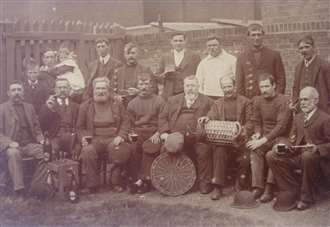By Canterbury pub expert, Rory Kehoe
Until quite recently, Whitstable hosted dozens of local community pubs, which offered customers much more than simply a pie and pint.

Then as now, pubs were an integral part of our social fabric.
Over the decades, due to brewery takeovers, redevelopment and the march of time, many of these small pubs have disappeared, though some survive and continue to serve their local communities well. Long may this continue.
One such local, which called time about 40 years ago, was the Guinea.
Located on Island Wall and built c.1840, the Guinea is reputed to have been named after the “spade” guineas that the first owner salvaged whilst working as a wreck diver.
It’s worth remembering, in 1840, that a guinea (£1.05) was a good weekly wage and a pint would have cost you three halfpence (just over 1/2p!). Think on that, next time someone wants to charge you six quid for a pint of imitation Italian lager!

Unsurprisingly, the history of most pubs passes into the mists of time and soon gets forgotten, simply because nobody writes anything down. It’s not really what we visit pubs for, is it?
Similarly, when old photographs surface, it’s rare to find those in shot named, or any description of what was going on. Remarkable then, that someone at the Guinea recorded some names on the back of a c.1908 photograph which recently came my way.
This photograph, taken in the Guinea’s back yard, features the pub darts team, which may have won a closely-fought match, or been celebrating success in a local league.
The team played on a Kent doubles board, which has no trebles or outer bull. Traditionally made of elm, these boards were soaked in water overnight, which helped keep them in tip-top condition. The players’ darts would have been wooden-shafted, weighted with bands of lead and flighted with real feathers.
The Guinea was a tied house of Flint’s St. Dunstan’s Brewery, so the dark beer (possibly porter?) that the players are drinking, from quart bottles and a gallon stone jar, would have been brewed by them.

In 1923, Flint’s was acquired by Leney’s Phoenix Brewery, Dover. However, in 1926, Leney’s leased all their pubs to Fremlin’s Maidstone Brewery and the Guinea went “under the elephant” until 1967, when Whitbread’s took control.
If you recognise anyone in the 1908 picture, or have any photographs, signs, bottle labels, or other items relating to any of Kent’s old breweries and pubs, which could be scanned, copied, or even purchased, please contact me at rmkcanterbury@hotmail.com. As a local historian and collector, I’m always keen to expand my knowledge of Kent’s brewing heritage.
